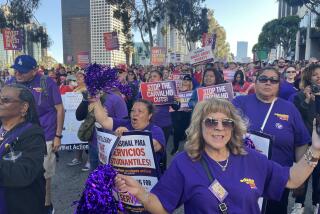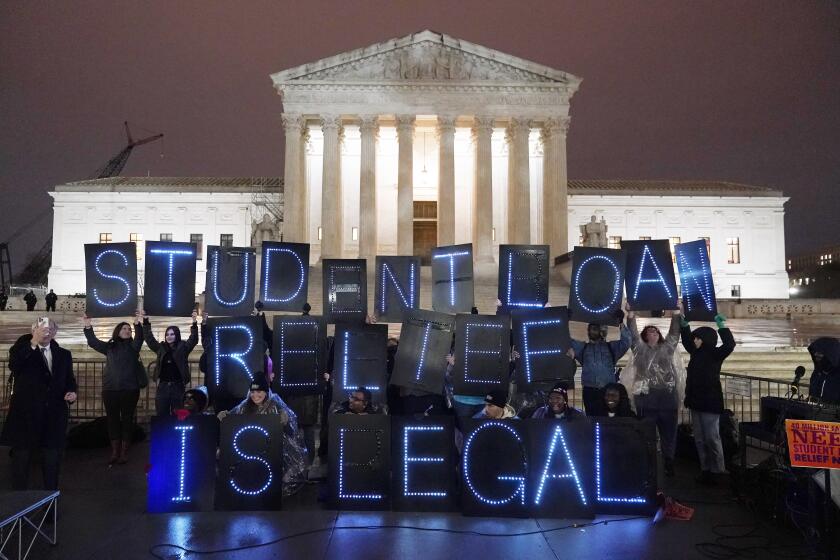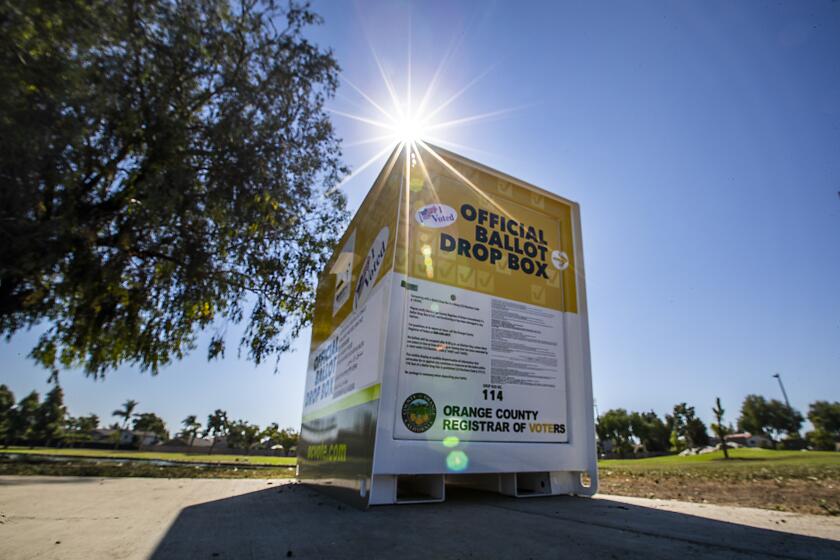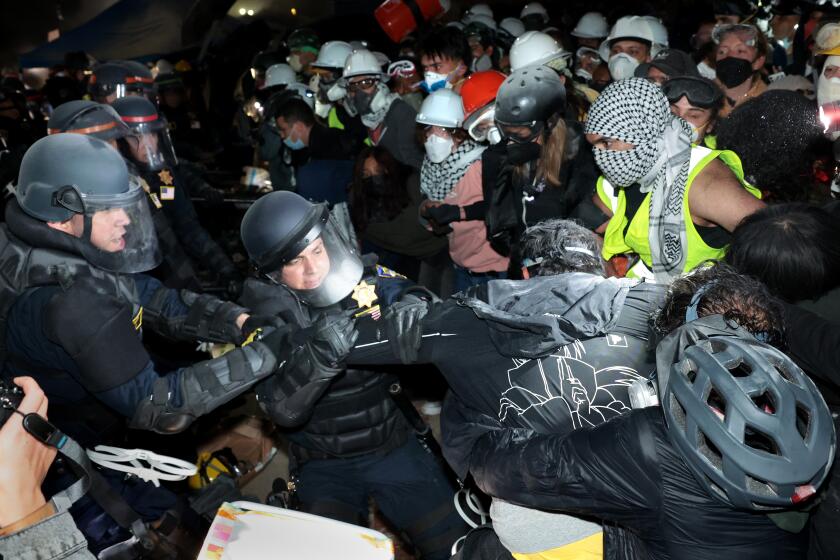Free Labor by Students Questioned : Education: Officials say course work should aid the community--not the staff of public vocational schools.
Adult school Principal Harlan Barbanell’s Encino front yard has new sprinklers, a thick covering of red apple ground cover, and 100 blooming bougainvillea and daisy plants--the work of landscaping students from his school who spent two months there earning course certificates.
Barbanell, principal of the West Valley Occupational Center, didn’t break any Los Angeles Unified School District rules.
But the work is drawing criticism--and attention--to the longstanding practice among adult school staff members of getting free work from students learning career trades.
Los Angeles city schoolteachers, administrators and clerks have their cars tuned up, engines rebuilt, sofas reupholstered, hair and nails done, and even kitchens remodeled at dramatically low cost.
“Everyone on staff has had the perks and privilege of having some work done,” said Janine Quint, the teachers union representative at the West Valley Occupational Center, who had her home wallpapered and car tuned up by students. “Maybe it would seem that it wouldn’t be right, but that’s the way occupational schools are.”
Some Los Angeles Board of Education members say the practice should change, so that community members--as well as the city’s campuses--share in the benefits being enjoyed by a limited number of school employees.
According to state law, students must perform the work--ranging from hairstyling to auto repairs--for free while in vocational school. The free labor is available to anyone but is rarely advertised, except for being mentioned on some school marquees.
So students learning trades work for school employees--a practice that school board President Mark Slavkin said has the potential for abuse.
“My concern is that teachers, principals or anyone else with authority over students . . . should be very sensitive and very careful to avoid any appearance of exploiting their authority for any personal advantage,” Slavkin said.
School board members, including Slavkin, said they will ask for a review of the vocational school guidelines to determine whether changes should be made in how students are used for off-campus work.
Principal Barbanell, whose Encino hills home was landscaped last spring, called his decision to use student workers “a win-win” situation. “The students won, the school won,” he said. “It met their needs, and it met my needs.”
In Barbanell’s home landscaping project, students dug 100 holes for one-gallon plants, installed an irrigation system and planted ground cover. Barbanell said he paid $2,500 for the plants and materials, and made donations to a school fund-raising effort.
Over the last five years, the West Valley landscaping class has worked on about 20 off-campus projects--including six private homes, three belonging to school employees.
Landscaping student Thomas Hochbrueckner said: “I learned quite a bit” working at the principal’s house. The irrigation work, especially, “was a very good opportunity.”
But school board member George Kiriyama, a former adult school principal, said he has never asked a student to work at his home for course credit. “That’s a touchy one. I just wouldn’t do it,” Kiriyama said.
School board member David Tokofsky said the practice of allowing students to work for free for school employees penalizes the city’s campuses, which the district can only afford to paint every 100 years. “Forget the larger community for a minute, we have schools that could use the help,” he said.
Some campuses benefit from work provided by students from the district’s 12 occupational and skills centers. Carpentry students from North Valley Occupational Center rebuilt the school’s benches recently, and West Valley Occupational Center students landscaped portions of Cleveland and Aliso high schools, as well as Woodlake Elementary School.
Adult school teachers say they are always looking for projects to complement classroom instruction with hands-on experience. The vocational schools, open to students 18 and older, offer courses such as auto repair, printing, landscaping, cosmetology and electronics.
Under state law, schools are prohibited from either charging for labor or earning a profit. The state Education Code restricts the revenues of vocational schools to the cost of instruction and operation. So city schools charge a nominal $10 fee per project to cover administrative costs. Customers are charged only for new parts needed for car repairs and other services.
“It’s not the intent of the program to run a business and make money,” said Assistant Supt. Jim Figueroa, who oversees adult education. “Advertising would draw in a lot more people than we could handle and probably we’d have a public relations problem when we started turning people away.”
Besides, administrators and teachers say they are wary of advertising students’ services to a public that might include more demanding customers. Students need additional time to complete the jobs and they cannot be held liable for poor work, they say.
Some school districts avoid the appearance of impropriety by advertising for customers or restricting who can use the student workers.
The Simi Valley Unified School District advertises its adult schools’ cosmetology classes in local newspapers several times a month, and it limits its auto repair program to students’ vehicles only.
And when Burbank Adult School offered landscaping classes a few years ago, class projects were limited to parks and the grounds of Burbank Unified School District campuses. “Students never worked at private homes,” Principal Ann Brooks said.
Los Angeles school district policy allows adult schools to establish their own rules governing student work. Teachers are primarily responsible for selecting class projects that fit into the course curriculum.
“We don’t tell them, ‘Thou shalt go out and do this work,’ ” said Wayne Morrison, the director of curriculum and guidance for the district’s adult schools. “They decide how to best reach their educational goals. They just don’t go to work, they go to learn.”
And work is one of the best ways for students to learn their trades, educators say. Bob Robinson, a Belmont High School teacher and the president of the Los Angeles Industrial Technology Education Assn., had his truck reupholstered and the engine rebuilt by students. He said real-life projects are the only way students will learn their trade.
“It gives them the practice they really need,” Robinson said. “It’s the only way they’re going to get hands-on training.”
More to Read
Sign up for Essential California
The most important California stories and recommendations in your inbox every morning.
You may occasionally receive promotional content from the Los Angeles Times.






